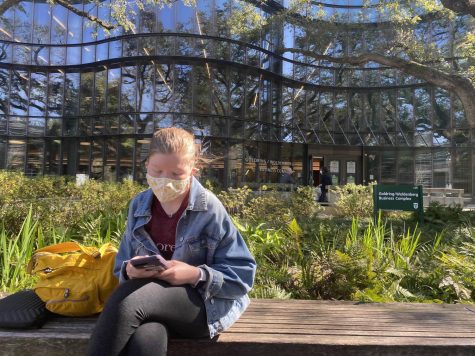
COVID-19 cases at Tulane University rose during return to campus in August, mirroring statewide increases of illness that returned this summer — more than three years since the pandemic began.
In an email from Campus Health sent to students on Friday, Tulane said there has been “an increase in COVID-19 cases nationwide, including in the Tulane community.”
The school is “treating COVID-19 as something more akin to other respiratory illnesses such as the flu,” the email said. “We are, however, monitoring the situation and will make any changes to our policy if recommended by public health officials.”
Life at Tulane has mostly returned to normal, almost four years into the COVID-19 pandemic. This semester, the school has not required any of the early pandemic protocols, like masking or social distancing. Tulane announced this summer it strongly recommends but no longer requires vaccines and boosters.
But this fall, some students said they tested positive as early as the first day of class via at-home tests.
English professor Erin Kappeler asked her students to wear masks on Aug. 29. After the first two class meetings, she said three students out of the seven had notified her that they had tested positive for COVID-19, and two others notified her that they were ill with symptoms that could have been COVID-19.
“I teach two classes back to back in the same room, meaning all of my students, none of whom wore masks for the first two class meetings, were directly exposed to COVID-19,” Kappeler said. “I asked students to wear masks for our next meeting to try to slow the spread. We know that COVID-19 is on campus and we know that masks help to slow the spread of COVID-19, so this seems a logical and reasonable request. A couple of students refused, but most did not seem bothered by the request.”
Dr. Patricia Kissinger — professor, infectious disease epidemiologist and associate dean of faculty affairs and development — said most people have antibodies, either from a vaccine or previous infection.
“There’s less urgency than there was,” Kissinger said.
Tulane spokesperson Mike Strecker said most students who have reported positive tests to the university this fall are “experiencing mild flu-like symptoms.”
“The case numbers for Tulane and Orleans parish as a whole are nothing compared to the level we saw at the height of the pandemic,” Strecker said in a statement.
It is nearly impossible to tell how many students have tested positive for COVID-19 at Tulane. Tulane does not require students to notify the university if they test positive and has discontinued the database of cases it kept updated throughout the early pandemic.
But cases are rising across the country.
Louisiana recorded over 8,000 new cases last week, according to the state Department of Health. Those numbers jumped significantly from early summer lows. In June, numbers showed as few as 128 new cases per week throughout the state. But by Aug. 13, Louisiana recorded 738 new cases a week. Hospitalizations remain low throughout the state.
Cases are also rising across the regions home to many New Orleans college students. In Mississippi, COVID-19 hospitalizations rose 21% last week and more than 1,400 people reported illness with symptoms similar to the COVID-19. In California — home to many Tulane students — hospitalizations in August rose by nearly 32% in two weeks.
The strains likely circulating are the latest versions of the omicron variant and may also include a new subvariant called EG.5.
The Centers for Disease Control and Prevention does not expect new variants to lead to dramatic surges, especially among the vaccinated. Current vaccines still have some protection from the strains, and a new fall booster is expected to target the newest strains more effectively.
Still, some schools across New Orleans have taken note.
Dillard University in New Orleans announced last week it would require students and employees to wear masks indoors in response to the rising cases across Louisiana and the South. The mandate is likely temporary and the university told students masking would be required while it watches case trends.
Kissinger called that choice “heavy handed.”
“The majority of the population has some kind of antibodies,” Kissinger said. “The majority of the Tulane community is younger and healthier, so it won’t be as much of a concern.
“They can continue to do what they’re doing and we don’t need to go on lockdown,” Kissinger said. “We definitely don’t need to do hybrid.”
At Loyola University, Vice President of Student Affairs Alicia Bourque warned students in an email last week that cases are rising at the Uptown campus, which is just steps from Tulane. She urged basic hygiene practices like handwashing and covering coughs, the Loyola Maroon reported, but made no mention of masks.
Kappeler said she was aware of COVID-19 spreading fast on campus, so she felt asking students to wear masks would help stop the spread.
“It seems logical to me to mask to protect ourselves and especially members of our community who are immunocompromised or who may end up dealing with major complications,” Kappeler said. “I know we all want things to go back to normal, but unfortunately viruses don’t care what we want.”
Kissinger feels Tulane handled the pandemic effectively.
“Tulane did a great job,” Kissinger said, by testing students and tracking cases during the early pandemic. “So I think we’ve got a good roadmap if another pandemic like this comes.”



